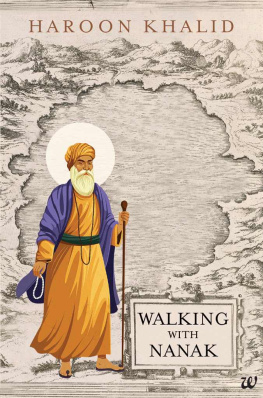Sarna - The Book of Nanak
Here you can read online Sarna - The Book of Nanak full text of the book (entire story) in english for free. Download pdf and epub, get meaning, cover and reviews about this ebook. City: London;Delhi, year: 2009, publisher: Penguin Books Ltd;Penguin India, genre: Art. Description of the work, (preface) as well as reviews are available. Best literature library LitArk.com created for fans of good reading and offers a wide selection of genres:
Romance novel
Science fiction
Adventure
Detective
Science
History
Home and family
Prose
Art
Politics
Computer
Non-fiction
Religion
Business
Children
Humor
Choose a favorite category and find really read worthwhile books. Enjoy immersion in the world of imagination, feel the emotions of the characters or learn something new for yourself, make an fascinating discovery.

The Book of Nanak: summary, description and annotation
We offer to read an annotation, description, summary or preface (depends on what the author of the book "The Book of Nanak" wrote himself). If you haven't found the necessary information about the book — write in the comments, we will try to find it.
The Book of Nanak — read online for free the complete book (whole text) full work
Below is the text of the book, divided by pages. System saving the place of the last page read, allows you to conveniently read the book "The Book of Nanak" online for free, without having to search again every time where you left off. Put a bookmark, and you can go to the page where you finished reading at any time.
Font size:
Interval:
Bookmark:
In 1469 the tiny village of Talwandi, forty miles south-west of Lahore, witnessed the birth of one of the greatest spiritual leaders of mankind and the founder of Indias youngest major religion, Sikhism. Born into a society caught in the throes of orthodoxy and ritualism and further crippled by child marriage, infanticide and a rigid caste system, Guru Nanak was to become the harbinger of a period of social, spiritual and religious enlightenment. Deeply spiritual from an early age, Nanak spent his early years in meditation and in the company of hermits, and is believed to have attained enlightenment at the age of thirty. His teachings, which stressed the omnipresence of the One God, and the importance of love, equality, compassion and community service, appealed to Hindus and Muslims alike. Along with his companion and disciple, Mardana, Nanak spent twenty-three years in travel, which took him to places as far afield as Sri Lanka and Mecca, to spread his message.
Drawing upon the various legends contained in anecdotal biographies and Bhai Gurdass first heroic ode, and placing them in as precise a historical framework as possible. The Book of Nanak reconstructs the main events of Nanaks life, throwing new light on the life and teachings of a phenomenal seer. The last section of the book also contains original translations of some of Nanaks best-known hymns that continue to inspire millions the world over.
Navtej Sarna was born in Jalandar, Punjab. After studying law at Delhi University, he joined the Indian Forign Service in 1980. He has served as a diplomat in Moscow, Geneva, Tehran, Washington, DC and Tel Aviv and as India's Foreign Office Spokesman in New Delhi.
His first novel, We Weren't Lovers Like That, was published in 2003 and has been translated into Arabic and Hindi. His second novel, The Exile, was published in 2008. He is also the author of Folk Tales of Poland. His short stories have been broadcast over the BBC World Service and published in India and the UK. He contributes regularly to the Times Literary Supplement, The Hindu and other journals.
'A hundred times a day
I sacrifice myself unto my Guru
Who without delay
Made Gods of men'
Shlok from the
Asa Di Var, Adi Grandth

PENGUIN BOOKS
Published by the Penguin Group
Penguin Books India Pvt. Ltd, 11 Community Centre, Panchsheel Park, New Delhi 110 017, India
Penguin Group (USA) Inc., 375 Hudson Street, New York, NY 10014, USA
Penguin Group (Canada), 90 Eglinton Avenue East, Suite 700, Toronto, Ontario, M4P 2Y3, Canada (a division of Pearson Penguin Canada Inc.)
Penguin Books Ltd, 80 Strand, London WC2R 0RL, UK
Penguin Ireland, 25 St Stephen's Green, Dublin 2, Ireland (a division of Penguin Books Ltd)
Penguin Books (Australia), 250 Camberwell Road, Camberwell, Victoria 3124, Australia (a division of Pearson Australia Group Pty Ltd)
Penguin Books (NZ), 67 Apollo Drive, Albany, Rosedale, North Shore 0632,New Zealand (a division of Pearson New Zealand Ltd)
Penguin Books (South Africa) (Pty) Ltd, 24 Sturdee Avenue, Rosebank, Johannesburg 2196, South Africa
Penguin Books Ltd, Registered Offices: 80 Strand, London WC2R 0RL, England
First published in Viking by Penguin Books India 2003
Published in Penguin Books 2009
Text copyright Navtej Sarna 2003
Illustrations copyright Penguin Books India 2003
All rights reserved
ISBN: 978-01-4306-693-4
This Digital Edition published 2011. e-ISBN: 978-81-8475-022-5
Digital conversion prepared by DK Digital Media, India.
This e-book is sold subject to the condition that it shall not, by way of trade or otherwise, be lent, resold, hired out, or otherwise circulated without the publishers prior written consent in any form of binding or cover other than that in which it is published and without a similar condition including this condition being imposed on the subsequent purchaser and without limiting the rights under copyright reserved above, no part of this publication may be reproduced, stored in or introduced into a retrieval system, or transmitted in any form or by any means (electronic, mechanical, photocopying, recording or otherwise), without the prior written permission of both the copyright owner and the above-mentioned publisher of this e-book.
Dedicate d
to the beloved memory of my fathe r
Mohinder Singh Sarn a
and to the values that he cherishe d
This book would not have been possible but for the work done by several scholars, historians and poets on the life, times and teachings of Guru Nanak. To all of them I owe my gratitude, particularly to Sardar Harbans Singh, who treaded a careful path through the multitude of contradictions presented by the sources.
The translations of Guru Nanaks hymns by Sardar Manmohan Singh proved to be an invaluable base for my own attempt; the inconsistencies that exist are solely mine.
I would also like to thank Dr Jeevan S. Deol of Cambridge University for going through the manuscript and making very valuable suggestions.

The five centuries that have elapsed since the time that Guru Nanak walked on this earth are but the blink of an eye in the history of men. Contemporaneous events are well known; men who lived at that time are well remembered. As I write these words, a glance outside the window takes me to the Lodhi tombs, still in good repair, where sultans from the Lodhi dynasty who ruled Delhi during Guru Nanaks lifetime lie buried. It was in Nanaks time that the first of the Mughals, Babar, invaded India several times, and finally, winning the first battle of Panipat, replaced Ibrahim Lodhi on the throne of Hindustan. His son Humayun, the white dome of whose tomb in Delhi shimmers in the hazy afternoon light, was battling to protect his fledgling empire when Nanak passed away. The Qutub Minar, whose once majestic domination of Delhis skyline is now challenged by innumerable high-rise buildings, pre dates Nanaks birth by more than two centuries.
Somewhat ironically, events that took place in other parts of the world during Guru Nanaks lifetime are even more current in our imagination. Columbus, in search of fabled India, stumbled upon the New World. Vasco da Gama found the route to India. Magellan completed the first voyage around the world. Corpus Christi College, that still stands at Oxford, was started, and Martin Luther took up the challenge of Reformation in Germany. We are not therefore dealing with one of the ancients, lost in the mist of time or remembered only through myths and hearsay. Guru Nanak, one of the greatest spiritual teachers mankind has known and the founder of Indias youngest major religion, is young in human memory. His impact is recent, his message fresh.
What is lacking, and that is the reason that the above needed to be said, is precise historical detail regarding the life of Nanak, thus making it sound more distant than it actually is. There are no available records of that time, no exact itineraries of his incredible travels, no eyewitness accounts that would have brought home the immediacy of Nanaks world to us. For details of Guru Nanaks life we have to turn to sources which are not biographical in their approach: Nanaks own writings, Bhai Gurdass first var or heroic ode, and the janamsakhis or anecdotal biographies, the earliest of which were written several decades after Nanaks death. Later writings on the life of Guru Nanak derive essentially from one or the other cycles of the janamsakhis and do not unearth new empirical data.
Font size:
Interval:
Bookmark:
Similar books «The Book of Nanak»
Look at similar books to The Book of Nanak. We have selected literature similar in name and meaning in the hope of providing readers with more options to find new, interesting, not yet read works.
Discussion, reviews of the book The Book of Nanak and just readers' own opinions. Leave your comments, write what you think about the work, its meaning or the main characters. Specify what exactly you liked and what you didn't like, and why you think so.



